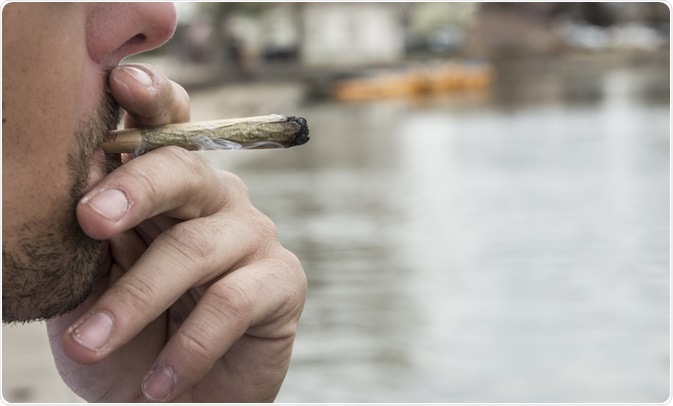Recreational drug use denotes the occasional intake of licit or illicit drugs during periods of leisure time and for the purposes of enjoyment. This article considers how the outbreak of the severe acute respiratory syndrome coronavirus 2 (SARS-Cov-2), which is the virus responsible for the coronavirus disease 2019 (COVID-19), has affected recreational drug use.

Image Credit: Mitch M / Shutterstock.com
Stressful and dramatic events
Exposure to stressful situations can exacerbate tendencies toward the overconsumption of alcohol, for instance, leading to episodes of drunkenness. As well as personal crises, researchers have mapped trends in the overuse of substances in association with dramatic events, such as man-made economic crises and natural disasters. Some examples of these events include the 2007-2009 recession, which includes the so-called ‘credit crunch’ of 2008, hurricanes Katrina and Rita in 2005, as well as the attack on the World Trade Center in New York on September 11, 2001.
The outbreak of SARS-CoV-2 constitutes yet another dramatic, stressful, and world-altering event that has brought unprecedented change to lives all across the globe.
Changes in habits
The lockdown was a particularly risky moment for habitual drug users. To this end, the restrictive measures put in place by governments created feelings of isolation, which exacerbated mental health struggles for vulnerable groups who were already susceptible to psychological issues like depression and anxiety.
Alcohol is the most commonly used psychoactive substance. Reports indicated increases in sales of alcohol in supermarkets and off-licenses during the pandemic. In fact, some studies have found that about 30% of participants drank at risky levels to cope during the pandemic. Conversely, there were also reductions in alcohol consumption for some people due to fear of loss of employment.
Some of the reasons that have been given for the increase in drug use during the COVID-19 pandemic included boredom, more free time, stress, and feelings of isolation.
Those who drank at high-risk levels were those who were already drinking prior to the outbreak of the pandemic. A common reason for the increase in alcohol consumption among these individuals included relief from unpleasant emotions and self-medicating for anxiety and depression.
As a coping strategy to manage stress, the use of any kind of drug, including alcohol, proves to be an ineffective solution. Although symptoms are released in the short term, the use of drugs elicits a cycle in which the uncomfortable symptoms are increased, rather than improved.
Who was affected?
Researchers have not identified any patterns in terms of gender, educational level of achievement, employment, and place of residence for those who increased their consumption of drugs during the pandemic.
However, in some studies, researchers discovered a marked increase in alcohol consumption amongst those belonging to older age groups and those with no children. These types of increases in drug consumption can increase the risk of recreational drug use becoming a substance use disorder (SUD).
COVID-19 and SUDs
Individuals with SUDs are often at a much higher risk of becoming seriously ill in the event that they contract COVID-19. This risk can further be exacerbated by individuals with SUDs who also have underlying health conditions associated with their drug use, which can further increase their chances of experiencing the severe symptoms of COVID-19.
Those who use drugs and live amongst others in group settings are especially at risk and having a SUD. It is therefore vital for those affected by SUDs to receive the COVID-19 vaccine in an effort to reduce their personal risk for serious and life-threatening complications, as well as altruistically minimize the risks of infection to those around them.
Among the many things that changed during the COVID-19 pandemic include the lack of access to support services and support networks for many people who are vulnerable to SUDs. This subsequently increased the chance that individuals with previous SUDs would relapse.
The risks for drug users were also increased during the pandemic, as temporary border closures affected usual illicit drug-running routes and led to a scarcity of classic street drugs. Governmental restrictions also led to the closure of recreational settings where drugs are commonly used.
This scenario did not decrease the use of drugs and rather led to increased use of house drugs like cognitive enhancers and new psychoactive substances.
In some places, the typical risks associated with drug use were significantly increased due to the higher likelihood of drugs being mixed with harmful contaminants. Reports from the United States, for example, revealed an increased number of fatal overdoses in drug users in the wake of the global pandemic.
Coronavirus drug abuse: A pandemic within a pandemic? | COVID-19 Special
What do we know so far?
The COVID-19 pandemic has had a profound effect on the incidence of substance misuse and what had previously constituted recreational drug use. Meanwhile, those with pre-existing problems became particularly vulnerable and at an increased risk of various adverse effects from their drug use.
While these findings may appear bleak, researchers have found the COVID-19 pandemic as an ideal opportunity to study the interrelationship between mental health and substance use.
In fact, several surveys that have been conducted around the globe have proven valuable, many of which are still ongoing. Once the results of these studies are published, the general public will have a greater appreciation of the consequences of COVID-19 when it comes to substance use and misuse.
References
Further Reading